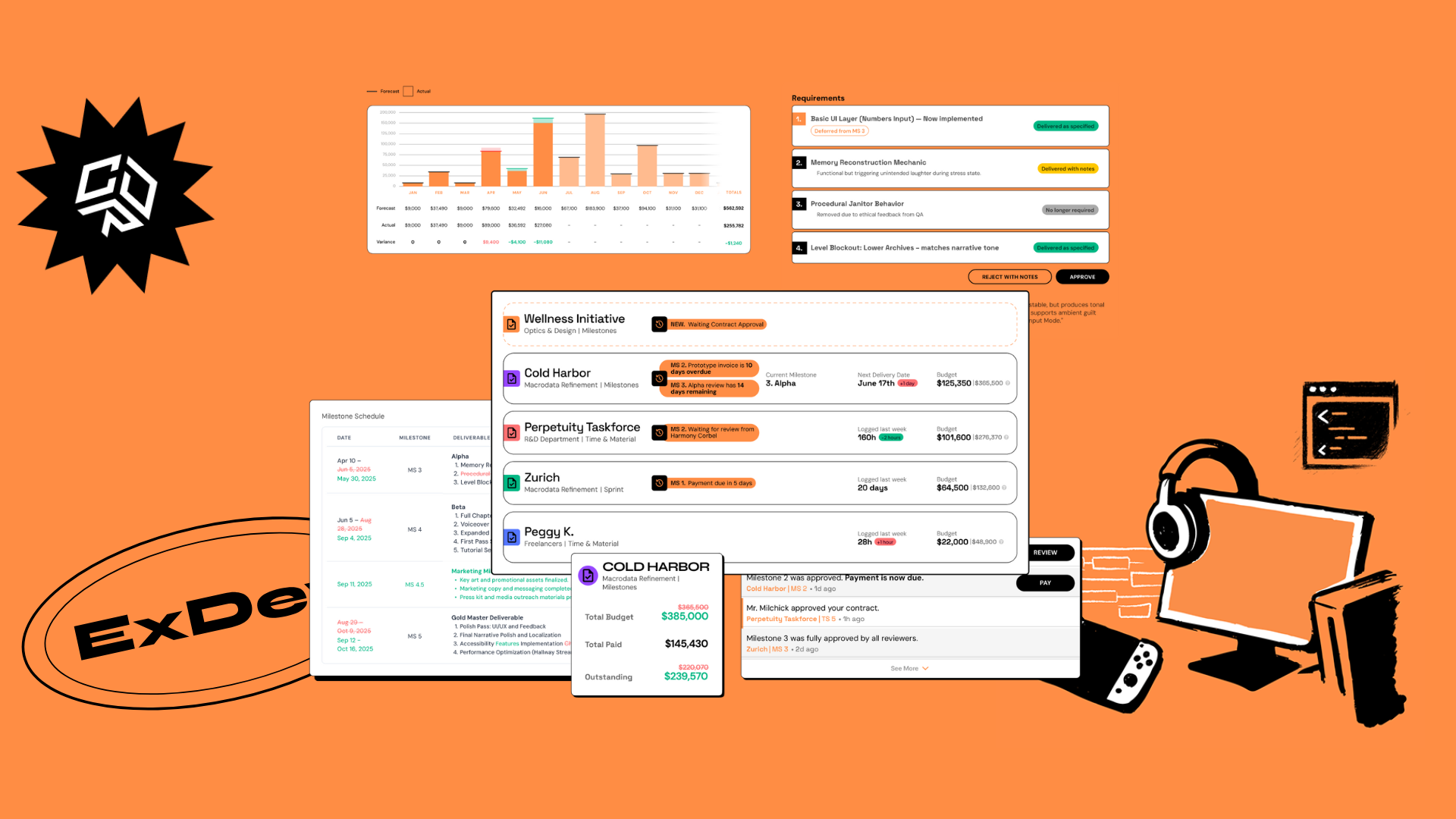Over the past few years, we've seen a trend in AAA game studios sending more work externally and investing more in ExDev operations. Companies like PlayStation have publicly announced increased outsourcing and co-development strategies to combat rising costs, and EA is seeing how far they can push the ExDev envelope with Full-Circle Studios.
AAA studios clearly recognize the future of game development is modular, but smaller and AA studios haven't embraced the approach with the same enthusiasm. After talking with dozens of founders, it makes sense why: if you’ve been successfully making games the same way for decades and you're not beholden to a corporate parent demanding a change in operations…why change?
ominous synth music intensifies
Smaller teams ignoring ExDev is a missed opportunity, because in many ways there is more potential value in outsourcing. Let’s unpack.
Advantage 1 - Bigger Selection
AAA studios are limited to the outsourcing teams they can partner with based on security and scalability. If a provider can’t pass a company’s corporate IT audit, it’s a hard no from the jump. And because AAA projects are massive, hiring a partner team of one or two people isn't helpful. Most ExDev managers won’t even look at a studio unless they can scale up significantly.
But smaller studios don't have these constraints. You’re able to work with tiny one- or two-person teams, so your selection pool increases exponentially. There may only be a couple hundred companies that could meet the security/scalability requirements a AAA team has to meet, but without that limitation, you’ve got thousands to choose from.
This isn't to say security doesn't matter for indies. Well, maybe it doesn't, but let’s be real: the stakes are a little different between an unannounced Star Wars IP and your average indie game. And when it comes to scale, the same resources that barely register on a AAA project can be transformative for a small team. Hiring two people can make a massive difference.
That kind of breadth means you’re not just picking from who’s available, you’re choosing from who’s ideal. With more options on the table, you can prioritize fit, deep experience, creativity…not just scale or compliance. And the right match doesn’t just support your game, it can elevate it.
Advantage 2 - “We’ve Solved That Problem”
Thanks to their hefty budgets, AAA’s can afford to staff specialists in extremely narrow fields across nearly every area of their tech stack. That’s slowly changing as service partners are taking on more responsibility over time, but ExDev’s roots are in task-based outsourcing and old habits die hard.
Smaller studios don’t have the luxury of beefy budgets, so they tend to lean on generalists; multi-talented folks who can wear a lot of hats and keep things moving. That flexibility is a strength, but it has its limits. Generalists often lack the deep domain knowledge required to solve highly specialized problems efficiently, or with the level of polish players demand.
Sounds like indie teams are stuck choosing between narrow mastery and broad experience, right? Not quite. Staying lean while leveraging external expertise lets you bring in exactly the help you need when you need it. Instead of hiring a full-time specialist to own a process, you can bring in a partner for a specialized engagement. Someone who’s already solved the challenges you're facing without carrying the full-time overhead. It’s not just about how much a partner knows; it’s about finding someone who’s built what you’re trying to build, available for the right time, scope, and impact.
And the benefits go well beyond the immediate impact:
- Knowledge Transfer - Your team levels up by working alongside seasoned experts—learning faster, planning smarter, and avoiding costly missteps others have already made.
- Focus - Internal teams can stay focused on what makes their game unique, while delegating complex or boilerplate systems to partners who know how to do it right.
- Creative perspective - External teams from diverse backgrounds can bring fresh perspective to your project - challenging assumptions and offering new solutions.
(If you’re asking why AAA studios don’t get these same benefits from ExDev, then you’ve probably never tried to convince a 200-person org to change how they work.)
Smaller studios often benefit from a true collaboration partner. Someone who can explore ideas, give honest feedback, and help shape the product. That kind of partnership is way more natural (and valuable) in a more agile setting.
So, what’s the catch?
The advantages of ExDev for smaller studios are real, but unfortunately they don’t come for free. Here’s what is standing in the way:
1) Doing “ExDev” effectively is a skill.
External Development is an operational discipline, not just a strategic decision and most small teams aren't set up to do it well. From procurement and contracting, to onboarding and daily management - there’s a learning curve and it’s usually paid for in time, money or both.
This is especially true when it's a small studio working with a small studio. Larger service providers tend to build out robust processes, onboarding systems, and communication tools on behalf of their clients. Smaller providers? Not so much. Without strong infrastructure, even top talent can stumble. And when expectations, deliverables, or workflows aren’t clearly defined, the odds of critical miscommunications, missed deadlines, and costly disputes skyrocket.
2) You only get the selection advantage if you know where to look.
The value of having thousands of potential partners only matters if you can meaningfully assess them and find studios with complementary skill sets to yours where each team brings their unique strengths to the table. That means locating partners that have the right capabilities, past experience, and collaboration style.
Overcoming these obstacles is why we started CDR. We've spent the last 18 months mapping the games services industry, profiling over 2,000 studios by genre, art style, team capability and more so we can connect you with your ideal "sister studio," a partner that complements your strengths while matching your working style and culture.
Making the Leap
If you're convinced that co-development might be right for your studio, how do you get started? Having a structured approach to partner selection is a good place to begin. Rather than simply asking friends for referrals (though that's not a bad idea), consider:
- What skills are you missing that you’d be comfortable externalizing?
- What creative work defines your studio and should stay in-house?
- What cultural traits matter most in a partner beyond technical ability?
The right partnership can be transformative, allowing your team to focus their energy on what they do best while bringing in specialized expertise exactly where you need it most.
By embracing co-development strategically, smaller studios can achieve what was once only possible for larger teams: creating higher quality games with greater efficiency and less burnout along the way.
Want to learn more about building effective game development partnerships? Let's connect.





